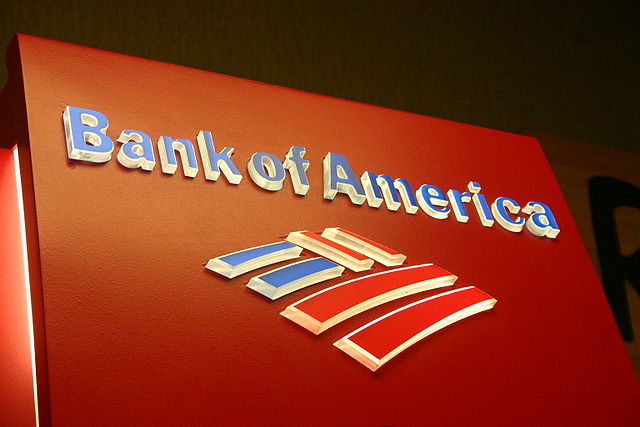Banking, finance, and taxes
Bank of America Makes Earnings Confusing With Reporting of Charges
Published:
Bank of America Corp. (NYSE: BAC) has reported that its first quarter of 2015 brought net income of $3.4 billion. This generated earnings of $0.27 per share, on revenues of $21.42 billion. The banking giant did disclose that the earnings per share (EPS) included $0.06 per share in annual retirement-eligible incentive costs, and that it included $0.03 per share in charges to revenue for market-related net interest income adjustments.
Thomson Reuters had the consensus earnings estimate at $0.29 per share on $21.5 billion in revenue. This further compared to -$0.05 EPS and $22.77 billion in revenues from a year earlier.
Shares closed at $15.82 ahead of earnings. This level compared to a stated book value that rose 4% from a year earlier to $21.66 per share, and it compared to a tangible book value per share that was up 7% from a year earlier to $14.79 per share.
Bank of America went on to show that its estimated common equity Tier 1 ratio under Basel 3 was at 10.3%. It also posted record global excess liquidity of $478 billion, a gain of $51 billion from a year earlier.
ALSO READ: Merrill Lynch Sees 3 Financials Beating Earnings Handily
The bank showed several other metrics and milestones as well:
Chief Executive Officer Brian Moynihan tried to remain upbeat in the report:
Continuing the trend from last quarter, we saw core loan and deposit growth, higher mortgage originations, and increased wealth management client balances. We retained a top position in investment banking as our team generated the highest advisory fees since the Merrill Lynch merger. We see continued encouraging signs in customer and client activity, with consumer spending increasing and utilization of credit by our commercial customers rising. This should bode well for the near-term economic outlook.
At a time of continued low interest rates, we had good expense control as we focus on responsible growth with a balanced platform to create long-term value for customers and shareholders.
ALSO READ: Why Many Banks Need Fed Interest Rate Hikes Sooner Rather Than Later
It appears as though investors are treating the net number second to the operating number, even if you remove whatever it said about market-related net interest income adjustments. If so, then Bank of America beat earnings and revenues were just a fraction under expectations. After closing up two cents on Tuesday at $15.82, the premarket indication was down three cents at $15.79. The stock has a 52-week trading range of $14.37 to $18.21 and a consensus price target of $18.40.
Are you ahead, or behind on retirement? For families with more than $500,000 saved for retirement, finding a financial advisor who puts your interest first can be the difference, and today it’s easier than ever. SmartAsset’s free tool matches you with up to three fiduciary financial advisors who serve your area in minutes. Each advisor has been carefully vetted and must act in your best interests. Start your search now.
If you’ve saved and built a substantial nest egg for you and your family, don’t delay; get started right here and help your retirement dreams become a retirement reality.
Thank you for reading! Have some feedback for us?
Contact the 24/7 Wall St. editorial team.